BIG STORY
Malami Faces Probe Over Five Suspicious Mega Deals Under His Watch
Published
2 years agoon
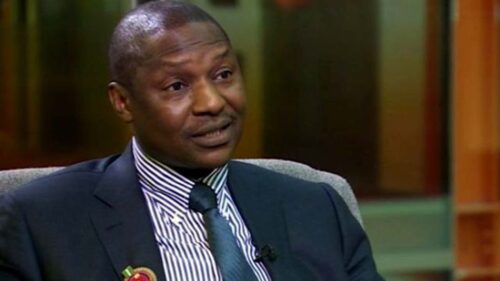
Abubakar Malami, former attorney-general of the federation (AGF), will be questioned over at least five suspicious transactions during his time in office, TheCable understands.
Five of the transactions under investigation are:
- The mysterious payment of $496 million to Global Steel Holdings Ltd (GSHL) as settlement for the termination of the Ajaokuta Steel concession nine years after the Indian company had waved all claims for compensation.
- His handling of the sale of assets worth billions of naira forfeited to the Economic and Financial Crimes Commission (EFCC) by politically exposed persons.
- His role in the $419 million judgment debt awarded to consultants who claimed to have facilitated the Paris Club refunds to the states.
- The strange agreement to pay Sunrise Power $200 million compensation in its dispute with the federal government over the Mambilla power project.
- The duplicated legal fees in the transfer of $321 million Abacha loot from Switzerland to Nigeria.
It was gathered that his name has cropped up in a number of questionable deals under the last administration.
A security agency will handle his interrogation, sources said.
AJAOKUTA DEAL: THE SETTLEMENT AFTER ‘SETTLEMENT’
In September 2022, Malami announced that the federal government had finally resolved the “long-standing contractual dispute” with Global Steel over the Ajaokuta Steel Company Limited (ASCL) and the National Iron Ore Mining Company (NIOMCO), Itakpe, concessions. He said instead of paying the original claim of $5.258 billion by GSHL over the termination of the concessions by the Olusegun Obasanjo administration, Nigeria had secured a 91 percent reduction and would pay $496 million only.
In 2013, Smart Adeyemi, then senator from Kogi state, had said the Goodluck Jonathan administration, which was in power at the time, had recovered the Ajaokuta mill “without any attendant financial obligation whatsoever”.
Malami’s settlement also came five years after Kayode Fayemi, then minister of mines and steel development, announced that Nigeria had resolved all the issues around Ajaokuta and recovered ownership.
Global Steel had entered the Nigerian steel industry in 2004 after securing five major concessions and entering share purchase agreements by the Obasanjo administration. Things went sour when the new administration of the late President Umaru Musa Yar’Adua came to power.
The government, in June 2008, revoked Global Steel’s 10-year Ajaokuta concession on the ground that the company was involved in asset stripping. It also terminated Global Steel’s concession for NIOMCO. This prompted Global Steel to opt for arbitration against Nigeria.
In 2010, a committee headed by Abdullahi Yola, then solicitor-general of the federation, recommended that the Jonathan administration should pay a compensation of $525 million to Global Steel for the revocations. Jonathan opted for mediation, with the Indian-owned company agreeing to mediation reportedly after its “underbelly” was exposed.
It was alleged that Global Steel had violated the terms of the concessions by not bringing in any foreign investment but rather leveraging on the assets of the companies to raise loans from Nigerian banks. It was also alleged that Global Steel had engaged in asset stripping — that is, selling the assets without regard for the company’s fortune. The company was accused of tax evasion and its promoters were to be prosecuted in a Nigerian court.
Faced with possible criminal charges, the promoters gave up their claims to Ajaokuta without any payment by the Nigerian government. In return, Itakpe was to be restored to them because the process of termination was considered faulty, unlike in the Ajaokuta case.
In 2016, the Buhari administration approved the execution of the modified concession agreement with Global Steel which allowed the firm to retain Itakpe. In September 2017, Fayemi announced that all agreements had been signed and Nigeria had now retrieved full ownership of the mills . Yemi Osinbajo, who was then vice-president, executed the agreement on behalf of Nigeria.
“With this development, both NIOMCO and Ajaokuta Steel Company Limited have now reverted to the Federal Government Nigeria, and we can now proceed to engage a new core investor with the financial and technical capacity to run the steel complex,” Fayemi said.
In May 2020, Global Steel curiously threatened to return to arbitration at the ICC sitting in Paris, France, in respect of all the contracts cancelled by the Yar’Adua administration. This was kept out of public knowledge by both the federal government and the company, with some insiders suggesting that the new threat was made in connivance with some senior government officials. The company’s lawyers threatened to claim up to $14 billion in damages but later reduced it to $5.258 billion.
On September 3, 2022, Nigeria announced that it had reached a settlement of $496 million with Global Steel, that it had rescued the Nigerian steel, iron ore and rail industries “from a variety of interminable and complex disputes”. Meanwhile, the legacy allegations of asset stripping, tax evasion and violation of the terms of agreement remain unresolved.
SELLING RECOVERED ASSETS IN THE DARK
In August 2022, Ladidi Mohammed, head of asset recovery and management unit, ministry of justice, was grilled by the EFCC over allegations of fraud but no charges were brought against her.
Mohammed, who is very close to Malami, was grilled over allegations of fraudulent sale of recovered assets worth billions. She was granted administrative bail with strident conditions which she could not meet immediately, and was later invited for further questioning.
She reportedly told EFCC that she acted under Malami’s instructions in disposing of some assets which were forfeited to the federal government by persons undergoing corruption trials. She was unable to produce any documented evidence to back her claims but said instructions were given to her verbally.
Malami had reportedly secretly granted a company and its attorneys a multibillion-naira assets recovery contract. The AGF gave the firm, Gerry Ikputu & Partners, an estate valuer, the task of recovering significant tracts of lands and structures believed to belong to the federal government in 10 states and the federal capital territory (FCT), Abuja. The firm also hired a legal firm, M. E. Sheriff & Co, to act as its agent.
With a confidentiality agreement prohibiting them from disclosing the specifics of the job, Malami’s letter granting them the contract said that they would be entitled to three percent of the value of each successful recovery. The award letter’s “confidentiality” clause forbids contractors from making public “any issue from this engagement without prior consent of the attorney-general of the federation and minister of justice”.
The letter dated October 5, 2021 gave the contractors six months period to lapse in April 2022. In the contract with M.E Sherrif & Co, Malami said the law firm had the duty of handing over the recovered assets to the AGF “for further necessary action and directives”.
He also asked the law firm “to work as a project team in collaboration with the Asset Recovery and Management Unit (ARMU) under the Office of the honourable attorney-general of the federation and minister of justice in carrying out this instruction”.
As many as 74 properties listed in the letter are located in high brow areas in Lagos, Rivers, Akwa Ibom, Cross River, Abia, Anambra, Edo, Enugu, Imo and Delta states and the FCT.
The AGF and the justice ministry came under the spotlight for their role in the recovery and sale of assets which was supposed to be the duty of the EFCC. Itse Sagay, then chairman of the presidential advisory committee against corruption (PACAC), had said there was no justification for engaging private firms to execute the recovery the anti-graft agencies were competent to do.
“The EFCC and the ICPC are authorised to recover stolen public assets. So, there is absolutely no justification for hiring a third party to do what government agencies have powers and experience to do,” he said. “So, it is strange for an outside agency, who does not have that record, and will have to be paid to recover the property. That shouldn’t be; it’s wrong. That doesn’t make sense.”
PARIS CLUB: CLUBBING WITH ‘CONSULTANTS’
In one of the most controversial cases under Malami’s tenure, some consultants, who claimed to have helped the states calculate their share of the Paris Club refunds, sued the federal government to court demanding to be paid their fees.
Malami, in what the governors described as a case of collusion but which he denies, opted for an out-of-court settlement. He agreed that the states — which were still vigorously disputing the claims — would pay $418 million to the consultants and the monies would be deducted from their federation allocations over time.
Ned Nwoko, the senator representing Delta north, was to get $68,658,192.83, while Ted Isighohi Edwards would receive $159,000,000. Others are: Riok Nig. Limited, $142,028,941.95; Orji Orizu, $1,219,440.45; Olaitan Bello, $215,195.36; and Panic Alert Security Systems Limited, $47.821,920.
This generated a public spat between Malami and the governors. While President Muhammadu Buhari initially withheld consent, he eventually approved and the consultants were given promissory notes. A federal high court sitting in Abuja has now restrained the consultants from transacting with the promissory notes.
In August 2022, the Nigeria Governors’ Forum (NGF) said the consultants were using Malami “to hustle” the states’ funds. Malami said that the NGF had no basis to reject the proposed deduction of $418 million, adding that the consultants’ claims were justified.
Abdulrazaque Bello-Barkindo, the forum’s head of media and public affairs, said there was no collective agreement between the consultants and the NGF, adding that the forum has requested the consultants to provide evidence of work done.
“There is no component that compels the governors’ forum to pay consultants anything, and there is no agreement between the consultants collectively and governors collectively,” he said. “The Paris fund money has been exhausted, and the consultants and the attorney general are expecting the money to be deducted from states’ accounts from sources over 52 or 58 months. That is unheard of. And what the NGF is saying is that there is no money to be paid and the monies that have been paid are gross errors.
“Where they are asking the monies to be gotten from is the biggest sacrilege. This money belongs to the states, the masses of this country and because you’re powerful, you want money to be taken and given to you. That’s why they are using the attorney general of the federation to get the money at the source because the state does not have any reason [to pay]. What the attorney general is claiming that there is a consent judgement is what the NGF is saying did not exist.
“What the NGF is saying is tasking is evidence of work done. Some of them said they have constructed primary health cares across the country, and other said they have provided boreholes, these are physical things that you can show. This matter is in court. The court is the only authority that can determine clearly whether there is a reason for payment or not, why are highly placed lawyers afraid of their own platform?”
In 2021, the governors obtained an order from a federal high court in Abuja restraining the federal government from deducting the money from states’ accounts for the purpose of paying the disputed debt.
Malami inexplicably committed Nigeria to pay Sunrise Power $200 million compensation over the Mambilla project without getting clearance from Buhari
MAMBILLA POWER: THE SUN SHINES ON SUNRISE
Early 2020, Malami committed the federal government to paying Sunrise Power and Transmission Company Limited (SPTCL) $200 million to as “final settlement” of the dispute over the Mambilla power project in Taraba state. He also agreed to pay a penalty of 10 per cent in case of a default in fulfilling the settlement agreement — in addition to restoring Sunrise as the local content partner for the $5.8 billion hydroelectric project.
In documents seen by TheCable, Malami and Mamman signed on behalf of the federal government while Leno Adesanya signed as chairman and CEO of Sunrise.
Sources said that Sunrise Power had previously asked for an $80 million settlement in order to withdraw its arbitration claim against Nigeria in France over an alleged breach of contract.
But Babatunde Fashola, who was minister of power, had contended in 2017 that there was no breach of contract as Sunrise had not done any work to warrant any demand or arbitration. Fashola also questioned the integrity of the contract. However, with Fashola’s exit from the ministry, a deal was put together by Mamman and Malami and facilitated by a female figure in Aso Rock.
The project, the biggest plant in the country, was conceived in the 1970s but has suffered severe delays. The 3,050-megawatt facility will be the second largest hydropower plant in Africa when completed.
In 2017, Sunrise Power, which claimed to have been awarded the build, operate and transfer (BOT) contract in 2003, had dragged the federal government and its Chinese partners before the International Chamber of Commerce (ICC) in Paris, France, over alleged breach of contract.
In a letter dated June 20, 2017 to the then Acting President Yemi Osinbajo requesting his intervention in the matter, Adesanya accused the late Abba Kyari, chief of staff to Buhari, of taking the unilateral decision of directing the ministry of power to sideline the company from the contract “against the advice of Malami”.
In the letter dated July 24, 2017 to Osinbajo, with a copy to the chief of staff, Malami had said SPTCL should be engaged as a local content partner to the project “as a means of accommodating its prior contractual interests on the project”.
He backtracked a few weeks later. In another letter dated August 17, 2017 to the company, Malami said he issued the previous opinion on the project based on the limited materials provided at the time. He added that there was no requisite federal executive council (FEC) approval for the project.
“The logical conclusion in the circumstances should be that there was no valid contract between Federal Government of Nigeria and SPTC in respect of the project or at all,” Malami wrote.
Not long after that, TheCable understands, Malami and Adesanya became very close, and the former AGF changed his legal opinion. In a memo to Buhari dated March 26, 2020, Malami asked him to approve the payment of $200 million to Sunrise Power as “full and final settlement” to discontinue the arbitration in Paris and set the government free from all liabilities in the dispute. However, Buhari, in his reply dated Monday, April 20, said: “FG does not have USD 200 million to pay SPTCL”.
The case is still in arbitration.
ABACHA LOOT: $17 MILLION BONANZA FOR LAWYERS
In 1999, federal government engaged the services of Enrico Monfrini, a Swiss lawyer, to help trace, identify, freeze and recover all looted funds traced to Sani Abacha, Nigeria’s military ruler, from 1993 to 1998. After seven years of work, including investigations and litigation across various countries, Monfrini traced and recovered $321 million from Luxemborg banks.
The funds were domiciled with the government of Switzerland in 2014 pending a final request for transfer from Nigeria. Monfrini and other lawyers involved had also been paid their fees, with the Swiss getting about $12 million.
However, Malami, rather than write directly to the Swiss authorities to seek the transfer of the funds to Nigeria, engaged Oladipo Okpeseyi and Temitope Adebayo, two Nigerian lawyers, to do the job again. Their involvement was basically to write to the Swiss authorities to return the funds to Nigeria as there was no asset tracing and recovery involved again.
They were paid $17 million as “professional fees” for writing the letter — more than the Swiss lawyer who traced and recovered the funds over a period of seven years. Okpeseyi and Adebayo were both members of the Congress for Progressive Change (CPC), the party founded by Buhari to contest in the 2011 presidential election. Malami was the legal adviser to the party.
Okpeseyi’s name featured regularly in legal transactions while Malami was in office.
Credit: The Cable
You may like
-
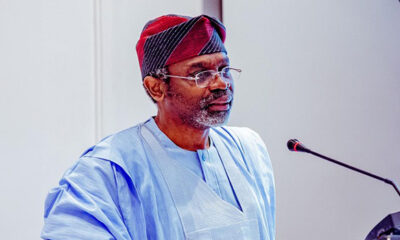

No Effective Governance Without Full Local Government Autonomy — Femi Gbajabiamila
-


DETAILED: Coroner Orders Prosecution Of Auxiliary Nurse Over Mohbad’s Death, Probe Into Police Inaction
-
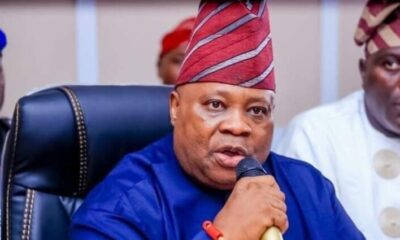

Jitters In Osun APC, PDP Over Adeleke’s Defection Plan
-


JUST IN: US Clarifies New Visa Rule For Nigerians, Cites Global Security Standards
-
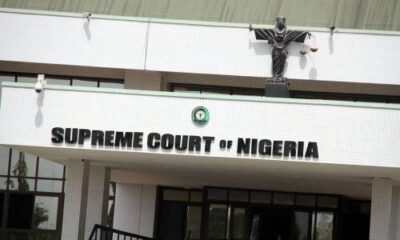

Autonomy Standoff: Governors Get N4.5tn Local Government Funds One Year After Supreme Court Ruling
-
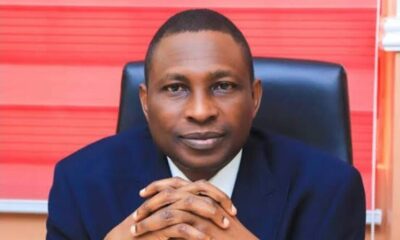

Corrupt Politicians Using Crypto Wallets To Launder Money — EFCC Chairman Olukoyede
BIG STORY
No Effective Governance Without Full Local Government Autonomy — Femi Gbajabiamila
Published
12 hours agoon
July 12, 2025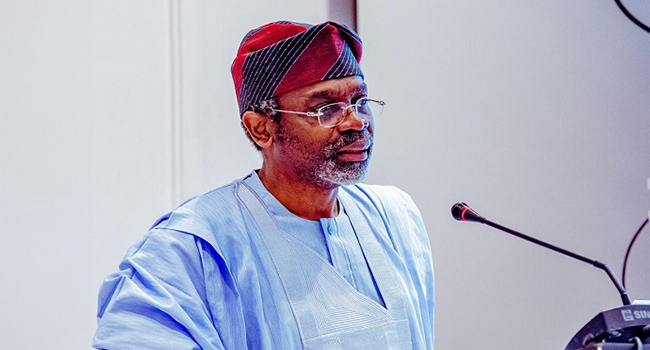
The Chief of Staff to President Bola Tinubu, Femi Gbajabiamila, has stated that governance at the local government level cannot be effective without complete autonomy.
He made the remark while addressing journalists after voting in the Lagos State local government elections in Surulere on Saturday.
When asked about the progress of implementing the LG autonomy ruling by the Supreme Court one year after it was delivered, Gbajabiamila described the process as ongoing and said it would be completed with time.
Gbajabiamila said, “The ruling was welcome by everybody. It’s the execution of that ruling and the implementation of that ruling that we are still trying to dot the Is and cross the Ts.
“I believe in a matter of time, we will realise full autonomy. There cannot be effective governance without full autonomy. That’s what we are working toward.”
In July 2024, the Supreme Court granted autonomy to all 774 local government areas across the country following a case filed by the federal government through the Minister of Justice and Attorney General of the Federation. However, the ruling is yet to be fully implemented.
Following the judgement, the Senate urged state and local governments to immediately adhere to the court’s directive, especially regarding local government accounts and direct fund disbursements.
The Senate also moved to amend relevant sections of the Constitution to ensure full local government autonomy nationwide.
The announcement was made by Deputy Senate President Senator Jibrin Barau, after lawmakers emerged from a closed-door session where they discussed alleged efforts by some state governments to bypass the Supreme Court’s ruling on July 11.
BIG STORY
DETAILED: Coroner Orders Prosecution Of Auxiliary Nurse Over Mohbad’s Death, Probe Into Police Inaction
Published
12 hours agoon
July 12, 2025
The Lagos State Coroner’s Court in Ikorodu has instructed the Director of Public Prosecutions to initiate legal action against Feyisayo Ogedengbe, the auxiliary nurse who gave the injection allegedly linked to the death of Nigerian artist Ilerioluwa Aloba, popularly known as Mohbad.
In her ruling delivered on Friday, Magistrate C.A. Shotobi stated that Ms Ogedengbe was not a registered nurse or licensed medical professional, and therefore acted outside the law by administering a tetanus injection that reportedly led to complications resulting in the singer’s death.
“This is not a case of foul play but one of medical negligence,” Magistrate Shotobi said. “While I cannot certify a definitive cause of death, I draw a link from the sudden reaction after the deceased was injected by the nurse.”
She further raised alarm about lapses in healthcare regulations, highlighting how unqualified individuals are allowed to operate as health practitioners.
In a related directive, the court ordered an inquiry into the failure of the Nigeria Police Force to act on a petition filed by the late singer before his death, asking relevant authorities to determine if negligence occurred.
Family members and their legal team—Wahab Shittu, a Senior Advocate of Nigeria, along with Kabir Akingbola and Abiola Kolawole from the African Women Lawyers Association—were in attendance when the ruling was delivered.
Testimonies and autopsy reports
According to the Coroner, 19 individuals, including relatives, doctors, and police personnel, provided testimony during the inquiry.
Based on the evidence of two independent pathologists who conducted separate autopsies, the court observed that the advanced state of decomposition of Mohbad’s body made it difficult to confirm an exact cause of death.
However, both experts agreed that a severe anaphylactic reaction to the tetanus shot was the most probable cause.
“The death is not linked to any evidence of foul play, but to medical negligence,” Magistrate Shotobi reaffirmed.
Criticisms of family and law enforcement
The court found no direct connection between Mohbad’s passing and the alleged harassment by his former label boss Azeez Fashola, known as Naira Marley, and associate Samson Eletu, also called Sam Larry, despite evidence of continued intimidation.
Nevertheless, the court condemned the manner of the singer’s burial, referring to it as “undignified.”
It criticised Joseph Aloba, the singer’s father, for not obtaining a death certificate or requesting an autopsy prior to the burial, despite receiving N2 million from fellow artist David Adeleke (Davido) to facilitate a proper funeral.
Omowunmi, Mohbad’s wife, was also faulted for failing to seek timely professional medical care for the singer over a 15-hour period and not adequately documenting the circumstances surrounding his death.
“She had a duty of care to her husband which was not sufficiently discharged,” the court said.
The court also condemned the police for ignoring the singer’s petition before his death, which included claims of assault and threats to life.
Describing the situation as “dereliction of duty,” the court ordered the immediate reopening of the case and instructed the police to question all individuals mentioned in the petition, including Naira Marley and Sam Larry.
Systemic breakdowns and court recommendations
Magistrate Shotobi noted that the circumstances surrounding Mohbad’s death exposed “systemic collapse” across multiple sectors such as family, healthcare, law enforcement, and the entertainment industry.
She called for the prosecution of Ms Ogedengbe on charges of gross medical negligence and urged that Mohbad be reburied in compliance with public health and legal standards.
She also demanded a formal investigation into police inaction regarding the deceased’s petition and advocated for legislative reforms to tackle bullying and abuse in the entertainment sector.
The court recommended a ban on intravenous medication by unlicensed individuals and emphasized that all sudden deaths involving young, seemingly healthy people must be investigated before burial.
Traditional funeral rites, the court warned, must not override statutory procedures in suspicious or abrupt death cases.
She also cautioned online content creators and influencers that disseminating falsehoods about court proceedings could be classified as obstruction of justice under Nigeria’s Cybercrimes Act.
Public reaction
The legal team representing Mohbad’s family praised the decision as a significant ruling.
Speaking to journalists, Mr Shittu, counsel to the singer’s father, described the court’s findings as “unprecedented jurisprudence” and “a PhD thesis in justice.”
“The ruling analysed the testimony of 19 witnesses. It revealed patterns: Mohbad felt unsafe, was harassed, and lacked institutional protection,” he said.
He added that the rushed burial compromised a thorough forensic investigation. “While Islamic law encourages swift burial, public interest in this case should have prevailed.”
Mr Shittu also reiterated the court’s position that police should act immediately on the singer’s petition, stating, “This is not a flawed investigation—it was never properly conducted in the first place.”
Kabir Akingbola, who represented Mohbad’s wife, cited cultural and emotional limitations. “Yoruba customs limit a wife’s power to challenge a father-in-law. Even if she wanted to intervene, grief and tradition may have silenced her,” he explained.
Background
Mohbad passed away on 12 September 2023 at age 26 and was buried the next day, sparking public outrage and widespread demonstrations.
Following public pressure, the Lagos State Police Command launched a 13-member investigation team on 18 September. His body was exhumed on 21 September for autopsy.
In April 2024, a second autopsy was ordered after the initial toxicology results were deemed inconclusive. US-based NMS Labs, allegedly contracted for testing, later denied receiving any related sample.
Summons were issued to key individuals including Naira Marley, Sam Larry, the nurse, and Mohbad’s wife. In March 2025, calls were made for Magistrate Shotobi to step aside from the case over alleged bias, but she continued until the final ruling.
Credit: Premium Times
BIG STORY
Jitters In Osun APC, PDP Over Adeleke’s Defection Plan
Published
12 hours agoon
July 12, 2025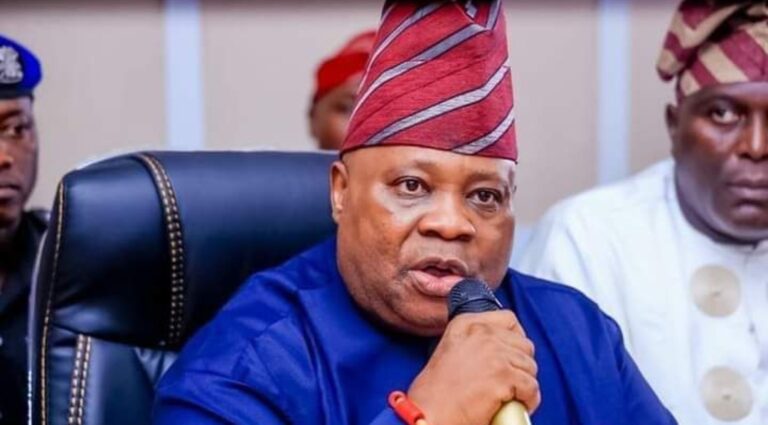
Panic has gripped both the Peoples Democratic Party and the All Progressives Congress in Osun State amid reports that Governor Ademola Adeleke may be planning to leave the PDP for the APC.
According to findings by The Punch, several close associates and appointees of the governor confirmed that Adeleke is close to finalising the defection.
The development has unsettled the APC, prompting a protest against Adeleke on Friday. However, in a statement by his spokesperson, Olawale Rasheed, the governor denied having any such intention.
Speculation about Adeleke’s defection began in June after he paid a visit to President Bola Tinubu at his Bourdillon residence in Lagos.
The governor was accompanied by his brother, billionaire businessman Adedeji Adeleke, and his nephew, Afrobeats artist David Adeleke, also known as Davido.
News of the visit was made public in a post on X by Tinubu’s Special Assistant on Social Media, Dada Olusegun.
Although the purpose of the meeting was not disclosed, the release of photos showing Tinubu and his wife in a warm exchange with the Adelekes triggered tension in both the Osun PDP and APC camps.
The rumour gained renewed attention this week following a series of cryptic posts by some of Adeleke’s aides on social media.
Close associates confirm move, APC ticket offer
Insiders in the governor’s cabinet, including a commissioner and two special advisers, told our correspondents that Adeleke had concluded plans to join the APC.
The commissioner, who spoke on condition of anonymity due to the sensitivity of the matter, said Adeleke had briefed some of his allies in his cabinet and the House of Assembly about his defection plan.
“Mr Governor will join the APC, but the official declaration will not be now. His planned defection is a result of political threats, the Federal Government withheld local government funds, and there are emerging threats to the businesses of his billionaire brother, Dr Deji Adeleke. So, there are many things at stake,” he said.
A senior official of the APC in the state also confirmed that the governor was consulting with APC leaders, but said his fate hangs on Tinubu’s move.
“Adeleke has been consulting many APC leaders. He has employed some mercenaries to lobby the President. But Baba Bisi Akande and Oyetola have not consented to his defection. The President will need to convince them before the governor will declare his defection,” the APC official said on Thursday.
In a symbolic move, the Osun PDP Director of Media and Information, Oladele Bamiji, who is also a Senior Special Assistant to Adeleke, posted “On Your Mandate!” on his Facebook timeline around 5 pm on Thursday.
The slogan is synonymous with Tinubu, having originated from his loyalists in Lagos State.
Bamiji’s post triggered reactions from other Facebook users, including APC members kicking against the move.
One of the governor’s special advisers, who also spoke on condition of anonymity due to the sensitivity of the matter, said the governor’s apparent uncertainty over the validity of his second-term ticket in the face of the PDP crisis might have triggered his proposed defection.
“INEC has released the timetable for the 2026 governorship election, and the PDP primary is coming up in September. Who is going to sign Adeleke’s nomination form amid the ongoing crisis in the PDP?
“We are all afraid that whatever happens in the PDP regarding the Osun election may be subject to litigation, which may invalidate the governor’s nomination and victory. That is why the governor wants to leave,” the aide said.
Also subtly confirming the move, another SSA to Adeleke, Olalekan Badmus, tweeted on his X handle on Friday: “After we all agreed to this, the next question is where?
“Governor Adeleke is currently consulting and evaluating all options on the table, including the peculiarities of all current political parties. Reports of imminent arrival at a particular party are at best speculative.”
Amid growing confirmation from the governor’s close associates, The Punch gathered that Tinubu’s Chief of Staff, Femi Gbajabiamila, and members of the President’s immediate family reportedly facilitated Adeleke’s move to the APC.
Adeleke remains in PDP – Spokesman
Reacting to the defection rumour, the spokesperson for the Osun State Government, Rasheed, said Adeleke remained in the PDP and was not considering joining the APC.
In a statement on Thursday, Rasheed quoted Adeleke as saying, “I assure the good people of Osun that I remain part and parcel of the PDP family. I am not defecting to any party.”
He said the governor reaffirmed his commitment to the implementation of his administration’s five-point agenda and urged the public to disregard what he described as “fake news,” while assuring continued delivery of good governance and democratic dividends.
Also reacting, the National Secretary of the APC, Ajibola Basiru, said the party’s national secretariat was unaware of any defection plan by the Osun governor.
In an interview (with Saturday Punch), Basiru said, “The only thing I can say is that I’m not aware of Adeleke’s so-called planned defection as the National Secretary of the party. All other things are hypothetical for now. I cannot be reacting based on social media frenzy!”
Similarly, the spokesperson for the Osun APC, Kola Olabisi, said the party leadership in the state had no knowledge of any move by Adeleke to join their ranks.
“It is still in the realm of speculation. The leadership of the APC in Osun, led by Sooko Tajudeen Lawal, is not aware of the governor’s defection plan,” he said.
When asked whether the party would welcome Adeleke, Olabisi replied, “Only the leadership of the party will speak on that.”
Panic in APC, PDP camps
Despite official denials, there is palpable tension among members of both the APC and PDP in Osun State.
It was gathered that the development has unsettled many APC members, particularly loyalists of former Governor Gboyega Oyetola, who fear that Adeleke’s entry into the APC could jeopardise the chances of their governorship aspirant, Bola Oyebamiji.
On the PDP side, some members have also expressed concern that the party may suffer significant setbacks if Adeleke defects, as the Adeleke dynasty is regarded as the party’s primary financier in Osun State.
It was noted that several APC members took to social media, especially Facebook, to express displeasure over the alleged plan.
A former Special Adviser to ex-Governor Oyetola on Education, Alhaji Jamiu Olawumi, wrote on his Facebook timeline on Thursday, “The Adeleke Challenge! If, as a governor, you have delivered, is it not shameful trying to run away from your own party?”
Another Oyetola loyalist, Adedeji Adebayo, also took to Facebook to criticise APC National Secretary, Basiru, for saying that President Tinubu would determine the APC’s governorship candidate in 2027, rather than speaking out against Adeleke’s rumoured defection.
He wrote, “The Adelekes’ agents in the APC are celebrating, granting media interviews about the phantom defection of the so-called ‘omo-gba-feeder’. Yes, the same omo-gba-feeder. They don’t care if it goes to a dullard since it’s not coming to them. That is the kind of wanton politics they play. Meanwhile, it is what it is: phantom defection. If Obente defects to APC, perhaps it is the APC AISU Chapter.”
‘No automatic ticket for gov’
On Friday, some Osun APC members staged a peaceful protest at the party’s state secretariat in Osogbo, insisting that if Adeleke defects, he should not be given an automatic governorship ticket.
Led by a member of the APC, Taofeek Afolabi, the protesters, mostly youths, said it would be unfair to hand the incumbent governor the party’s ticket without a contest.
“We are members of the All Progressives Congress, and we are here this morning to register our concern over the rumoured defection of Governor Ademola Adeleke to the APC. We are not saying he should not join our party. Adeleke joining the APC will boost our party. He is the current governor, and having him with us will strengthen the party,” Afolabi said.
“However, what we don’t want is the party giving Governor Adeleke an automatic ticket. If he wants to re-contest, he should express interest and contest the gubernatorial ticket with other aspirants.
“There are people who have shown interest in the race already, and we don’t want him to be handed the ticket without a proper contest. That is the only thing we are against. We have no issue with him joining our party,” he added.
PDP, APC chieftains divided
Saturday PUNCH gathered that members of both the PDP and APC remain divided over the governor’s reported defection plan.
While a section of the PDP reportedly supports the move, others have rejected it, insisting they would not follow the governor into another party.
A former Deputy National Publicity Secretary of the PDP, Diran Odeyemi, said realignment was part of politics and that there was nothing wrong with adjusting strategies to win elections.
“Politics is dynamic. It’s not like mathematics, where you get a fixed answer to an equation. It’s about permutation here and there. It’s a game that is played according to situations and circumstances, but with the sole purpose of winning,” Odeyemi said.
“Realignment is key in politics, more so because it is a game of interest. There is nothing wrong with redefining a strategy if it is aimed at winning any contest. As for us in the PDP, Governor Ademola Adeleke’s second term is sacrosanct; the way and manner to go about it is secondary.”
Meanwhile, a chieftain of the APC in Osun and an aide to ex-Governor Oyetola, Jamiu Olawumi, maintained that while party membership is a right, acceptance is not automatic.
“Politics and joining a political party are fundamental human rights. Joining a party is a free entry and free exit. However, in some situations, you cannot just join a political party because there are certain criteria for fresh members. If you’re not fit for it, we might not welcome your overtures,” he said.
Olawumi also dismissed the defection report as speculation.
“The highest hierarchy of the party has not spoken about the defection. Everybody is just reacting to rumours — we’ve had both confirmations and denials. This shouldn’t be given serious attention by serious people. In the APC, we are serious people, and we don’t dwell on this kind of unserious speculation. Let it remain in the realm of rumour,” he added.
We’re not worried—APC aspirants
Some governorship hopefuls in the Osun APC has said the defection rumour is not giving them sleepless nights.
One of them, Dotun Babayemi, said the development did not come as a surprise and would not affect his ambition.
Speaking through his spokesperson, Kayode Oladeji, Babayemi stated that Adeleke’s defection would, in fact, be an addition to the APC.
“We are not worried about Governor Ademola Adeleke or anybody coming into our great party, APC. We all know that democracy is a game of numbers. This means it is becoming clear that our party is poised to win in 2026, and President Tinubu’s victory in the 2027 elections shall be resounding,” he said.
“In the same vein, his joining our party cannot jeopardise my chances. My confidence is based on the amazing support and love being shown to me within and outside the APC, across the state, by both the old and the young.
“As to whether it is right for the governor to dump the PDP for the APC, I am not sure that is the real question — because we don’t know what is chasing him from the PDP,” he added.
Similarly, another governorship hopeful, Akin Ogunbiyi, said he was not surprised by Adeleke’s reported defection plan, declaring that the party would win the next governorship election in the state.
“I am not worried that the current governor is struggling to come to the APC. He is a serving governor, and he can come to the APC. Our party is a winning team, and we can all see what is happening at the federal level — what our father, the President, is doing.
“So, I am not surprised that not only in Osun State, but even across other states, people are declaring for the APC because it is a progressive party,” Ogunbiyi said.
PDP senators to dump party
Meanwhile, Saturday PUNCH has gathered that two PDP senators from Osun State, Adenigba Fadahunsi (Osun East) and Olubiyi Ajagunla (Osun Central), have concluded plans to leave the party.
According to aides, both lawmakers met with President Bola Tinubu at the Aso Rock Villa about a month ago, where the decision regarding their defection was finalised.
One of Ajagunla’s top aides, who spoke on condition of anonymity, said, “Ajagunla will leave the PDP soon, there is no doubt about that. The Adeleke dynasty is not treating him well, and our town, Ila-Orangun, has not benefited from the current administration in terms of infrastructure development.
“People know that Ajagunla has left the PDP; he just hasn’t announced his defection officially,” the aide said.
Credit: The Punch
Most Popular
-

 BIG STORY5 days ago
BIG STORY5 days agoJUST IN: ASUU Suspends Strike As Federal Government Pays June Salaries
-

 BIG STORY2 days ago
BIG STORY2 days agoREVEALED: Trump’s Visa Clampdown Linked To Nigeria’s Refusal To House Asylum Seekers — TheCable Report
-

 BIG STORY2 days ago
BIG STORY2 days agoJUST IN: US Clarifies New Visa Rule For Nigerians, Cites Global Security Standards
-

 BIG STORY5 days ago
BIG STORY5 days ago“JAPA”: US Embassy Begins Screening Nigerian Students’ Social Media Accounts
-

 BIG STORY4 days ago
BIG STORY4 days ago“JAPA”: Canada Increases Minimum Proof Of Funds To N17m For Immigrants
-

 BIG STORY3 days ago
BIG STORY3 days agoTunji-Ojo Meets US Envoy Over New Visa Policy, Says FG Will Curb Overstay By Nigerians
-

 BIG STORY4 days ago
BIG STORY4 days agoUK Introduces eVisas For Nigerian Study, Work Visa Applicants
-

 BIG STORY2 days ago
BIG STORY2 days agoLagos Steps Up: Wahab’s Cleanup Blitz And Plastic Ban Herald A New Environmental Era — By Babajide Fadoju









